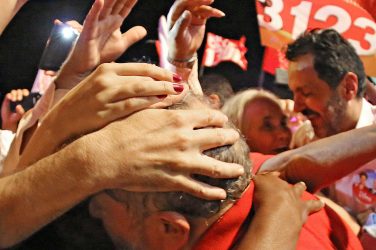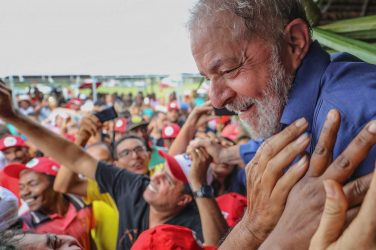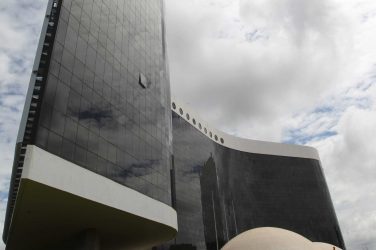 On his first official trip after assuming Brazil’s Presidency, Michel Temer is in Shanghai, China, where he attended Brazil-China High-Level Business Seminar.
On his first official trip after assuming Brazil’s Presidency, Michel Temer is in Shanghai, China, where he attended Brazil-China High-Level Business Seminar.
To reporters traveling with him, Temer mentioned the Senate’s decision to maintain Dilma Rousseff’s political rights. According to him, this is a legal issue now.
“The Senate made a decision. Whether it’s right or wrong, it doesn’t matter, the Senate made the decision. It seems that it is being legally questioned now. It now moves from the only political level to legal assessment,” he said
The meeting in Shanghai is sponsored by the Brazilian Ministry of Foreign Affairs and the Brazilian Trade Investment Promotion Agency (Apex-Brasil).

After Shanghai, Temer will travel to Hangzhou to attend the 11th G20 Summit (Group of 20 major economies) on September 4 and 5. At the moment, Temer will have his first bilateral meeting with a head of state: Chinese President Xi Jinping.
Temer is also expected to participate in meetings with presidents of the BRICS countries, bloc formed by Brazil, Russia, India, China and South Africa.
According to the Finance Ministry, for Brazil, a major point at issue is to speed up discussions over combating tax evasion, focusing on the taxation of multinational companies that break the law to avoid paying taxes both in the countries where they are based and in host countries.
Michel Temer took over as president on August 31, after the impeachment trial verdict, which permanently removed Rousseff from office.
During Temer’s trip, the speaker of the lower house, congressman Rodrigo Maia, becomes the acting commander-in-chief of the country.
PMDB Supports Appeal
The Brazilian Democratic Movement Party (PMDB), President Michel Temer’s party and the largest of the government’s coalition, decided to support and sign the petition filed by lawyers of Brazilian Social Democracy Party (PSDB) to the Supreme Court (STF), asking for the annulment of the second vote of President Dilma Rousseff’s impeachment trial.
The writ of mandamus argues that when she was sentenced by Senate and lost her presidential mandate, Rousseff should also automatically lose her political rights and would be ineligible for eight years.
Workers’ Party senators, Rousseff’s party, proposed an amendment to vote separately the former president’s loss of political rights, which was supported by Senate President Renan Calheiros, one of PMDB’s great leaders.
To win, the loss of political rights had to be voted by at least 54 senators, a two-third majority. However, only 42 votes were cast in favor, 36 against, and 3 abstentions.
The petition is signed by PSDB, DEM, PPS and now PMDB, which had a large part of the Senate’s bench voting for the maintenance of Dilma Rousseff’s political rights.
According to the advisory office of the party’s president, Senator Romero Jucá, the decision to sign the petition was made by the party and is not related to Michel Temer’s government.
Appeal to Supreme
Senator Cássio Cunha Lima, leader of the Brazilian Social Democracy Party (PSDB) in the Senate, announced that the party backtracked and decided to apply for a writ of mandamus in the Supreme Court against the senators’ decision to vote separately the impeachment of suspended President Dilma Rousseff.
In the first vote, 61 senators sentenced the president to loss of her presidential mandate for crime of responsibility. In the second, they rejected the sanction of loss of political rights for the following eight years, allowing Rousseff to hold a public office, including to work as manager, if applicable.
For PSDB senators, to apply the sanction of loss of political rights is part of the impeachment sentence. However, according to Cunha Lima, at first, the PSDB, the Democrats Party (DEM), and the Socialist Popular Party (PPS) considered that, when Rousseff was permanently removed from office, the greatest victory had been scored and felt no need for questioning the maintenance of former president’s political rights.
The PSDB senators changed their minds due to the Workers’ Party’s decision to appeal to the Supreme Court (STF) asking for the annulment of the entire trial. For Cunha Lima, it became necessary to question the second vote so that the court can examine separately the sanction of political rights without risking to annul the entire trial.
Discomfort
Cunha Lima has also not hidden the PSDB discomfort to the initiative of Senate President Renan Calheiros, who is member of the Brazilian Democratic Movement Party (PMDB), the same party of President Michel Temer, for the maintenance of Rousseff’s political rights. For him, “it was clear” that an agreement was secretly negotiated and the PSDB senators were not aware of it.
In Cunha Lima’s opinion, by doing this, Calheiros biased the trial. However, he thinks that one cannot “assign the responsibility for this action to the government, but only to Senator Renan Calheiros himself.”
Cunha Lima expects that, when returning from China, President Michel Temer will discuss the matter with his party’s colleagues and other coalition parties.
Reversed Expectations
Finance Minister Henrique Meirelles said that economic agents’ expectations have now taken the opposite direction. The statement was made in Shanghai, China, during the Brazil-China High-Level Business Seminar.
He described the trial of former President Dilma Rousseff by the Senate, conducted by Supreme Court Chief Justice Ricardo Lewandowski as entirely democratic.
“This was the process experienced by the country. But the good news is that the causes of all this have been reversed. Brazil’s new government was installed in an entirely democratic historic process, overseen by the Supreme Court and in compliance with constitutional norms, in a widely publicized trial.” The outcome, he said, rescued the confidence of economic agents and consumers.
GDP Growth
In Meirelles’s predictions, the Brazilian economy should expand 2.5% in 2018, with a likely increase in that rate. He also said that the government has worked on structural reforms with a view to recovering the country’s yearly 4% increase in the gross domestic product, as has been reported in the past.
“Brazil has historically proved to be capable of having significantly higher rates. And we’ll work to carry out all major reforms, so that Brazil resumes growth at some 4% per annum on average, as was once the case,” he said.
The government’s goal, the minister reported, is to preserve a stable macroeconomic environment for Brazil and decrease the size of the state, assigning higher priority to increasing efficiency through concessions in infrastructure and privatizations.
Cry of the Excluded
With the slogan “This system is Unbearable: excludes, degrades, kills,” based on Pope Francisco speech in Bolivia, this year the traditional Cry of the Excluded intends to criticize the capitalist system. The event always happens on September 7 and is organized by social movements and Catholic pastoral centers.
“It is a system that excludes and pushes a massive amount of human beings to world peripheries without access to fundamental and necessary things for life. And it makes a large amount of people settle for crumbs that fall from the table.
“It is a system that denies access to basic conditions to a vast majority of people,” said Bishop Milton Kenan Junior, from Barretos Diocese, in São Paulo.
According to Ari Alberti, coordinating the Cry of the Excluded, the event has happened for 22 years and was born with the idea that “it is necessary to build a popular project of society, another plan in which human life is in the first place, not the economy.”
“After 22 years, we realized that structural changes had not happened. There have been improvements, but we want changes,” said Alberti during a press conference in São Paulo to announce this year’s slogan.
Soniamara Maranhão, from the Movement of People Affected by Dams (MAB), said that the cry breaks out a clamor for a system that “needs to be destroyed and a new project that needs to be conceived by the workers.”
The event will happen in 24 of the 27 Brazilian states in an autonomous and decentralized way. In São Paulo, a Mass will be celebrated at Praça da Sé, city’s central area, followed by a walk around accommodations for immigrants.
ABr









